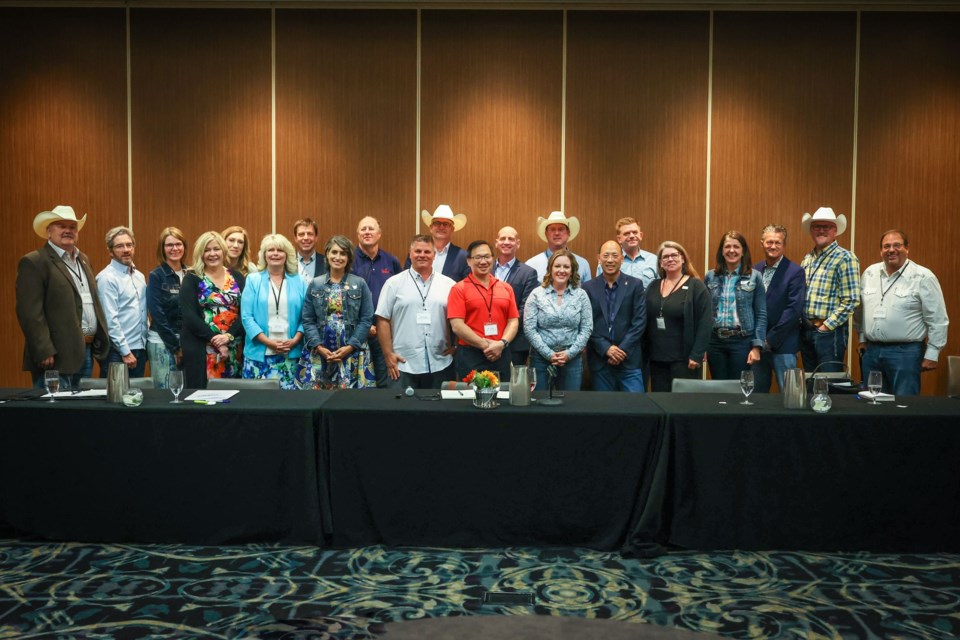The Mid-Sized Cities Mayors' Caucus (MCMC) wants to see a fairer approach to infrastructure funding when the Local Government Fiscal Framework (LGFF) comes into effect in 2024.
In a July 11 closed-door meeting in Calgary with Alberta’s UCP leadership candidates Brian Jean, Leela Aheer, Todd Loewen, Rebecca Shulz, Danielle Smith and Travis Toews, the 23 mayors whose municipalities comprise the MCMC made their request in hopes of being heard by whoever finds themselves in the seat as the province’s next premier.
“Calgary and Edmonton have charters they’ve negotiated with the province to allocate funding [towards],” explained , Cochrane Mayor Jeff Genung MCMC chair,. “We are asking if the province would consider doing a mid-sized cities charter that would set aside a pool of funds that would then be divvied up amongst our group so that we can get our fair share of funding from the province.”
Genung added he wants to make clear the caucus is not “asking for a handout.”
“We just want to be treated fairly and equitably given the infrastructure challenges we face as growing communities,” he said.
The Alberta government is removing the Municipal Sustainability Initiative (MSI) program in 2023 in favour of the LGFF, which will include $722 million in legislated capital funding and non-legislated operating funding.
The change allows the province an opportunity to seek input from local governments on the details of the new program, including the allocation formula and program administration.
Genung said the formula can’t be a one-size-fits-all approach, arguing the needs of Cochrane will be greater than a small summer village, for example. But in the case of the MCMC, the municipalities represented face many of the same challenges.
“All 24 of us have kind of the same issues and many of the same infrastructure needs,” he said. “So, we should get the same type of funding.”
In addition to Cochrane (and soon, Canmore), the MCMC is comprised of Airdrie, Beaumont, Brooks, Camrose, Chestermere, Cold Lake, Fort Saskatchewan, Grande Prairie, Lacombe, Leduc, Lethbridge, Lloydminster, Medicine Hat, Okotoks, Red Deer, Spruce Grove, St. Albert, Stony Plain, Strathcona County, Sylvan Lake, Wetaskiwin and the Regional Municipality of Wood Buffalo. Altogether, the caucus represents over one million Albertans.
Cochrane, Genung added, has shown it can be successful in working with the province on a joint funding partnership venture. The Highway 1A improvements – one piece of Cochrane’s much-needed transportation upgrades – is a shared expense between the province and the Town.
“We’re making a dent in these projects with the [Highway] 1A/22 interchange also in the works, but we still need the 1A hill up to Gleneagles twinned and Highway 22 South to Highway 1A widened or twinned, and a new bridge over the river,” said Genung. “So, our infrastructure needs are just starting to be met.
“We need to see some more attention and infrastructure money in our community and that’s not to be selfish as if to say, ‘Hey, you guys are already getting an $80 million interchange.’ That is just one piece of the puzzle that we need to address.”
After delivering their own message, the group also allowed each UCP leadership candidate 10 minutes to introduce themselves, speak about their platforms, and express how they would serve the mid-sized cities if they were successful in becoming Alberta’s next premier.
“We put ourselves on the map with the leadership hopefuls and we’ve taken advantage of the opportunities the Calgary Stampede has offered to network with these individuals,” Genung said. “I’m being very intentional about being in the faces of these people and they’re going to remember who I am as mayor, and by extension, who Cochrane is.”



